Weight gain last trimester
Pregnancy Weight Gain: How Much Should You Gain?
Putting on weight during pregnancy is not only normal but also healthy. However, when it comes to how much and when, there’s no one-size-fits-all answer, as everyone experiences pregnancy weight gain differently. Factors like your body type, your pre-pregnancy weight, whether you’re having multiples, and your general health status all play a role. Read on for more information about pregnancy weight gain and what’s healthy for you and your baby.
Where and Why Do Women Gain Weight During Pregnant?
Where do you tend to gain weight during pregnancy, you may wonder? Some but not all of your pregnancy weight gain consists of body fat around your tummy. But it is helpful to know that the average baby weighs around seven to eight pounds when born, which can be a significant portion of the average weight gain during pregnancy and contribute to your baby bump.
Besides your baby’s weight, other sources of pregnancy weight gain include:
Growing uterus (2 pounds)
Placenta (1.5 pounds)
Amniotic fluid (2 pounds)
Growing breasts (1 to 3 pounds)
Increased blood volume (3 to 4 pounds)
Increased fluid volume (2 to 3 pounds)
Extra stores of fat, protein, and other nutrients (6 to 8 pounds).
Of course, fat stores contribute to normal weight gain during pregnancy, and they play an important role. In your first trimester, you may notice some added fat in your lower abdomen, accumulating to protect and support your developing baby. After delivery, you’ll need those extra fat stores to fuel breast milk production. For the most part, however, you’ll gradually lose much of your pregnancy weight gain after your baby is born.
How Much Weight Should You Gain During Pregnancy?
Weight gain during pregnancy is ordinary, healthy, and necessary, but how much weight someone “should” gain is different for each person. Your body and situation will help you set goals for pregnancy weight gain.
Your body and situation will help you set goals for pregnancy weight gain.
Healthcare providers use a measurement known as body mass index (BMI) to determine a healthy and appropriate weight gain range for each individual, keeping pre-pregnancy weight in mind. BMI is a ratio derived by calculating your weight (in kilograms) by your height (in meters), squared. Although not perfect for every individual body, it estimates a measurement of body fat in most cases.
The general rule is that those with a lower "starting" BMI will have a greater recommended pregnancy weight gain than those with a higher starting BMI. Regardless of your pre-pregnancy BMI, the goal is to gain weight gradually, week by week.
Related pregnancy tool
Fill out your details:
Pre-pregnancy weight (lbs.)
This is a mandatory field.
Height (ft.)
This is a mandatory field.
Height (in.)
Current week of pregnancy (1 to 40)
This is a mandatory field.
Tick the box
I'm expecting twins
Recommended Weight Gain During Pregnancy
To help promote a healthy, gradual pregnancy weight gain during each trimester, you and your healthcare provider may rely on the following guidelines:
First trimester. During your first 13 weeks of pregnancy, a healthy weight gain generally ranges from no gain at all to about five pounds. It’s also possible to lose weight during these first few months, especially if you’re dealing with morning sickness. You don’t necessarily need to include any extra calories in your diet during your first trimester.
Second and third trimesters. Not all women need to add extra calories, but your provider may recommend including about 340 extra calories a day during your second trimester, and about 450 extra calories a day in your third trimester.
 With your baby growing steadily, it’s possible to gain between one-half and one pound each week if you started your pregnancy at a healthy weight.
With your baby growing steadily, it’s possible to gain between one-half and one pound each week if you started your pregnancy at a healthy weight.
The guidelines may vary depending on your BMI and other factors, such as if you’re expecting twins or multiples. It’s always best to talk to your healthcare provider before adjusting your diet during pregnancy.
Important Reminders for Healthy Pregnancy Weight Gain
A few additional points to keep in mind concerning pregnancy weight gain and calorie increases or decreases:
Listen to your body. There’s no need to force yourself to exceed your calorie intake if you’re not hungry. Instead, listen to your body, follow a healthy pregnancy nutrition plan, and discuss your calorie needs with your healthcare provider if you’re still unsure.
Don’t actively try to lose weight. Dieting while pregnant isn’t generally healthy, but still, be mindful of the foods you consume. Try to include lots of nutritious, healthy food rather than falling victim to the “eating for two” mentality that may lead to unhealthy food choices.

Talk to your healthcare provider. If you’re overweight or underweight, your healthcare provider can offer advice on proper nutrition and other ways to keep you and your baby healthy throughout your pregnancy. Your provider will consider your unique body and situation before advising how much weight you should gain during pregnancy.
Pregnancy Weight Gain Chart
To help you visualize the general recommendations above, we’ve created a pregnancy weight gain chart for singletons and twins by week. Talk to your healthcare provider about using the chart to help guide and manage your pregnancy weight gain.
Your healthcare provider will check your weight at your first prenatal care visit. You’ll also discuss your BMI and what it means for your individual pregnancy. At each visit after that, you’ll track your pregnancy weight gain together, and you can use the above chart as a general guideline.
You can also use the graph below to track your pregnancy weight gain:
Most likely, you’ll gain weight gradually, but your provider will help you along if you gain too little or too much, which could cause issues for you and/or your newborn as follows:
Women who gain too little weight during pregnancy tend to deliver smaller babies, who might suffer from specific health problems. If you fall into this category, your healthcare provider may suggest adding extra, healthy calories to your diet.
Women who gain too much weight during pregnancy risk developing health issues, including diabetes, high blood pressure, and hypertension. If you’re overweight, your provider may suggest adjusting your diet and adding light exercise to your routine.
Actively gaining or losing weight while pregnant may not be necessary, even if you start your pregnancy underweight or overweight. It’s best to consult your healthcare provider, who can offer ways to adjust your diet and daily routine.
Pregnancy Weight Gain: Week by Week
Gradual weight gain during pregnancy is ideal, and you can track your weight by weeks within individual trimesters. By doing this, you can get a general idea of how much weight you’re gaining. This article provides guidelines for weight gain within an average pregnancy (with a single baby starting at a normal BMI). If you’re having multiples or start with a lower or higher pre-pregnancy BMI, discuss your ideal weight gain with your healthcare provider and use this guide for general knowledge.
Pregnancy Weight Gain: First Trimester
Your first trimester typically includes weeks 1 to 13. Remember that during these early weeks of pregnancy, you probably won’t see steady weight gain. So, how much weight should you gain in the first trimester? Everyone is different, but the average weight gain for a normal pregnancy could be up to five pounds during the first three months—although it’s also possible to lose weight during this initial period.
Weeks 1 to 4. During your first month of pregnancy, it’s possible not even to know that you’re pregnant! You might not feel any symptoms or notice any weight gain. This has to do with the way many healthcare providers track your pregnancy, using the Last Menstrual Period (LMP) method.
If your pregnancy starts at the beginning of your last menstrual period, then you wouldn’t have ovulated (and, therefore, conceived) until after 14 days (assuming you have a 28-day cycle).
Because you wouldn’t be technically pregnant until week 3, it’s rare to gain any weight during your first month of pregnancy.
Weeks 5 to 8. Although your body will be going through quite a bit of change during these weeks, you still might not gain much weight. In fact, if you’re experiencing morning sickness, it’s possible to lose weight during this time.
Hormonal changes might cause digestive issues, prompting nausea, vomiting, or specific food aversions.

However, these same hormones might cause your breasts to get bigger as milk-producing glands enlarge, which could contribute to some minor weight gain.
Weeks 9 to 13. If you do gain any weight in your first trimester, it’s likely to occur during these weeks as your morning sickness, and other digestive issues, may start to subside.
Your breasts continue to get bigger due to growing milk-producing glands, so they may feel fuller or heavier.
It’s possible to have gained up to five pounds, thanks to your growing breasts, placenta, and uterus, plus an increased volume of amniotic fluid and blood.
Pregnancy Weight Gain: Second Trimester
When do you truly start gaining weight in your pregnancy? Your second trimester, which typically includes weeks 14 to 27, is when you might begin to see that gradual weight gain. During your second trimester, you could be adding half a pound and then a pound of weight a week. As mentioned above, talk to your healthcare provider about whether you should start increasing your daily calorie intake.
As mentioned above, talk to your healthcare provider about whether you should start increasing your daily calorie intake.
Weeks 14 to 17. You may start to gain half a pound a week, up to two or three pounds in total. It’s not unusual to see more weight gain one week compared to another.
Weeks 18 to 22. During these weeks, it’s possible to see up to one pound of pregnancy weight gain per week (or up to four pounds in total). In particular, you might notice your breasts have grown one or two cup sizes. By the end of week 20 of your pregnancy, you might see up to 10 extra pounds on the scale, or more!
Weeks 23 to 27. Your baby’s development is starting to impact your weight gain, as your little one will probably hit the one-pound mark by 24 weeks! Though you may gain about four pounds in total during this period, what you put on each week may vary. You may continue to add about one pound on average.
Pregnancy Weight Gain: Third Trimester
The third trimester typically consists of weeks 28 to 40 and beyond. At this point in your pregnancy, your weight gain may start to look fairly consistent at about one pound per week. So, how much weight do you gain in the third trimester? It’s possible to gain an extra 12 pounds or so, but keep in mind that healthy weight gain is different for each person.
At this point in your pregnancy, your weight gain may start to look fairly consistent at about one pound per week. So, how much weight do you gain in the third trimester? It’s possible to gain an extra 12 pounds or so, but keep in mind that healthy weight gain is different for each person.
Weeks 28 to 31. As you settle into your third trimester, you might start to gain weight more consistently—at a rate of about one pound each week.
This weight probably won’t include fat, though. Instead, weight gain in these weeks of pregnancy is usually from your developing baby, growing placenta, and increased fluids (amniotic and body tissue fluids).
Weight gain could also cause aches and pain or other sensations, like tingling, numbness, or swelling in your joints, wrists, and hands. These symptoms typically subside once you deliver your baby and lose your pregnancy weight.
Weeks 32 to 35. You’re in the home stretch of your pregnancy, and you may gain about a pound a week.
 You don’t want to gain too much during these final weeks, especially if you had a higher pre-pregnancy BMI. Continue to work with your healthcare provider and keep an eye on your weight.
You don’t want to gain too much during these final weeks, especially if you had a higher pre-pregnancy BMI. Continue to work with your healthcare provider and keep an eye on your weight.Weeks 36 to 40. During your final weeks of pregnancy, your baby is nearly fully developed. This means that you might not notice as much weight gain or even gain any at all. In fact, you may even lose a pound or two during this time!
To help you visualize your pregnancy weight gain week by week, we’ve included a general breakdown of trimester weeks in the chart below. Of course, any weight gain during pregnancy is related to your pre-pregnancy BMI and individual situation. For example, if you’re experiencing a twin pregnancy, you can expect to gain more weight. The chart below provides estimates for women with a normal pre-pregnancy BMI and expecting one baby.
Pregnancy Weight Gain Tracker
To make sure you’re gaining an appropriate amount of weight, as advised by your healthcare provider, it may help to use a tracker. You can start with our Pregnancy Weight Gain Calculator to find the ideal weight gain range for your unique pregnancy. Then, after talking to your provider, track your pregnancy weight gain week by week. This will help you understand if you’re on the right path, gaining too much or gaining too little.
You can start with our Pregnancy Weight Gain Calculator to find the ideal weight gain range for your unique pregnancy. Then, after talking to your provider, track your pregnancy weight gain week by week. This will help you understand if you’re on the right path, gaining too much or gaining too little.
Download our pregnancy weight gain tracker to help you along the way!
To know what to anticipate as your pregnancy progresses, including body changes and baby development, check out our pregnancy calendar.
How to Maintain a Healthy Weight During Pregnancy
It’s not easy to depict appropriate pregnancy weight gain in a chart or graph because everyone is different. Your pre-pregnancy BMI will impact how much weight you are advised to gain, as will other factors. Here are some general tips for maintaining a healthy weight while gaining those necessary and inevitable pounds during pregnancy.
Enjoy a healthy, varied diet.
 Maintaining a balanced diet during pregnancy is important to your health and the health of your baby. Include healthy carbohydrates, fats, and proteins in your daily diet, focusing on foods that offer a range of vitamins and minerals. Essential nutrients for your pregnancy include vitamins A, B, C, and D, plus calcium and iron, and, of course, folic acid.
Maintaining a balanced diet during pregnancy is important to your health and the health of your baby. Include healthy carbohydrates, fats, and proteins in your daily diet, focusing on foods that offer a range of vitamins and minerals. Essential nutrients for your pregnancy include vitamins A, B, C, and D, plus calcium and iron, and, of course, folic acid. Plan meals. When you're dealing with cravings, aches and pains, or morning sickness, it can be extra challenging to prepare healthy choices on the spot. Instead, spend some time planning and preparing meals and snacks ahead of time. Ask your partner, family, or friends to help!
Add calories little by little. If extra calories are needed, you can support gradual weight gain by increasing your calories slowly. If you’re having a single baby and start your pregnancy with a normal BMI, you may add about 340 daily calories during your second trimester. Then, add about 450 a day during your third trimester.
 Talk with your healthcare provider if you have any questions, are having multiples, or started with a low or high BMI.
Talk with your healthcare provider if you have any questions, are having multiples, or started with a low or high BMI. Get moving and stay active. Exercise may be the last thing you want to do while pregnant, but it can help you maintain an appropriate weight and support gradual weight gain. Plus, any type of exercise, even walking or running while pregnant, can help ease aches and pain, prepare your body for labor, and increase energy and mood! As a bonus, exercising now might make losing weight postpartum a little bit easier.
Talk to your healthcare provider if you notice any rapid weight gain early in your pregnancy or want to know how to slow down unhealthy pregnancy weight gain. Every individual body and pregnancy is unique, so your best source of support is your provider, who can help you navigate your individual experience.
The Bottom Line
Although gaining weight during pregnancy is normal, healthy, and expected, it’s not the easiest thing—emotionally or physically—to navigate.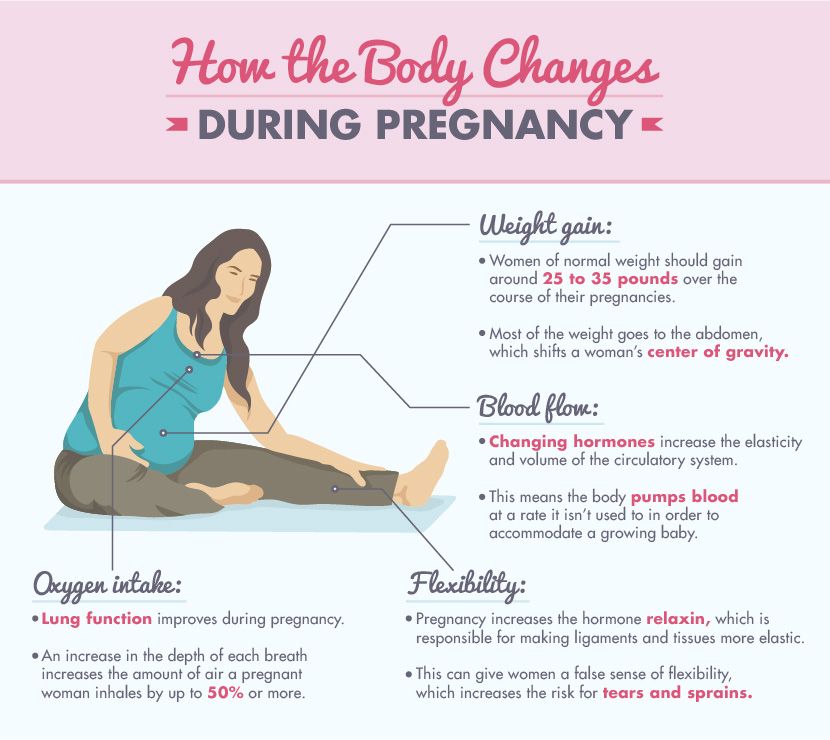 We hope you'll find it more manageable with the help of this guide and our pregnancy weight gain chart and tracker. A few key takeaways include the following:
We hope you'll find it more manageable with the help of this guide and our pregnancy weight gain chart and tracker. A few key takeaways include the following:
Everyone is different. Most pregnancy weight gain guides, charts, and trackers are general because every pregnancy is different. Our resources function as a foundation and guide but talk with your healthcare provider to understand your personal pregnancy weight goals.
Weight gain should be gradual. Above all else, your pregnancy weight gain should be gradual and somewhat consistent. If it’s not, it’s best to consult your healthcare provider. This means you can focus less on how much you might be gaining at one time and more on your pregnancy as a whole.
Consider your BMI. Although BMI isn’t the best indicator of overall health, it’s helpful when determining your ideal pregnancy weight gain. If you have a lower pre-pregnancy BMI, your healthcare provider may advise you to gain more weight throughout your pregnancy, whereas if yours is higher, you may need to gain less.

Enjoy a varied diet and light exercise. Help maintain a healthy pregnancy weight with a balanced diet and light exercise.
Speak with your healthcare provider. Pregnancy is a long journey, and your healthcare provider is your best source of support, advice, and guidance for your unique situation.
And remember, once your little one is born, you’ll start to lose that baby weight and enjoy time with your sweet newborn! All those cuddles, baby sounds, and diaper changes will quickly distract you. Download the Pampers Club app as you prepare to stock your nursery, earning rewards after purchasing all those newborn baby essentials.
Third trimester weight gain: What to expect
Women experience many significant physical and emotional changes during pregnancy. Third trimester weight gain is an important part of later pregnancy and is not usually a cause for concern.
Many women will experience rapid weight gain during their third trimester.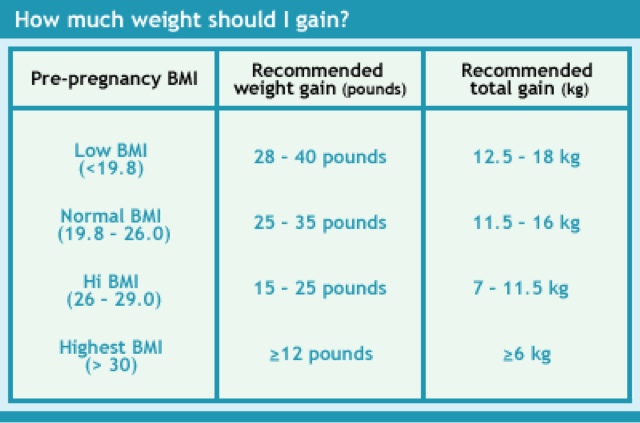 This is because the fetus typically gains the most weight in this time, according to the Office on Women’s Health (OWH).
This is because the fetus typically gains the most weight in this time, according to the Office on Women’s Health (OWH).
In this article, learn what to expect during the third trimester, when to see a doctor, and some tips on how to gain weight safely during pregnancy.
The amount of weight a woman gains during pregnancy depends on several factors, including:
- their pre-pregnancy body mass index (BMI)
- the number of gestations
- physical activity levels
- nutritional habits
The amount of weight a woman might expect to gain during her pregnancy depends on her pre-pregnancy BMI.
The following table contains pregnancy weight gain recommendations, in pounds (Ib), based on BMI from the Centers for Disease Control and Prevention (CDC):
| BMI before pregnancy | Weight gain recommendations for women pregnant with one fetus | Weight gain recommendations for women pregnant with twins |
| 28–40 lb | 50–62 lb | |
18.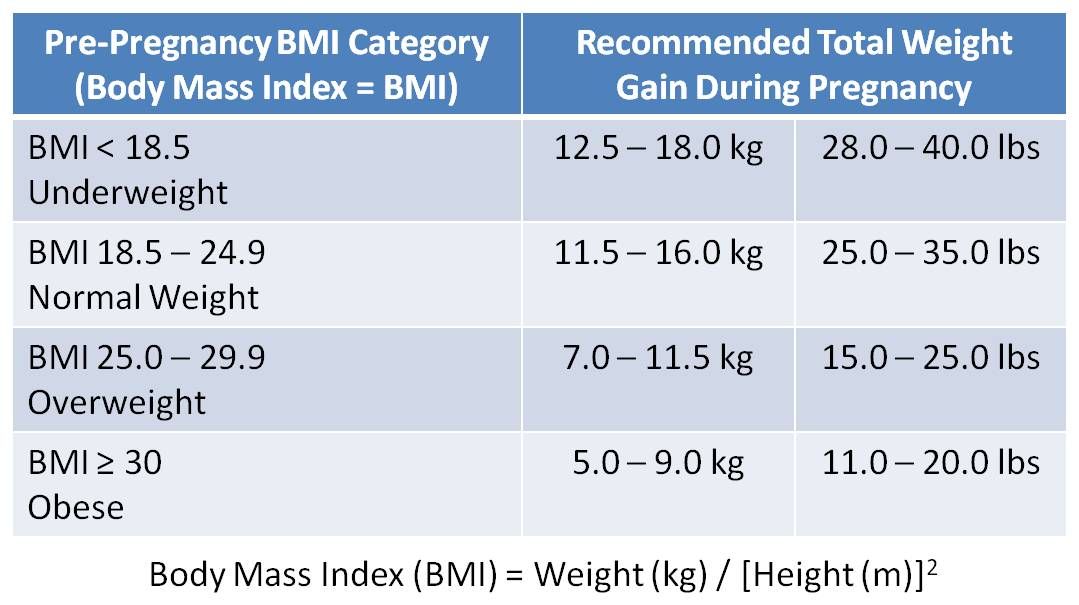 5–24.9 5–24.9 | 25–35 lb | 37–54 lb |
| 25–29.9 | 15–25 lb | 31–50 lb |
| ≥30 | 11–20 lb | 25–42 lb |
Women who are pregnant should seek immediate medical attention if they experience any of the following symptoms:
- persistent nausea
- multiple episodes of vomiting every day
- sudden swelling of the face and hands after the 20th week of pregnancy, as this may indicate preeclampsia
- chronic fatigue
- shortness of breath
- extreme thirst or hunger
- vaginal spotting or bleeding
- cramping in the abdomen or pelvic region
- increased vaginal discharge
If a woman has concerns about third trimester weight gain, it is important that they speak with a doctor.
A fetus usually gains the most weight during the third trimester. They will gain an average of 5 lb and grow around 4–6 inches during the third trimester, according to the OWH.
In addition to the weight from the growing fetus, the body also gains weight from:
- the placenta
- amniotic fluid
- breast tissue
- increased blood supply
- a larger uterus
- fat stores for delivery and breastfeeding
Other changes in the third trimester
The following changes and conditions can also occur during the third trimester of pregnancy:
- shortness of breath
- heartburn
- swelling of the feet, ankles, fingers, and face
- hemorrhoids
- swollen or tender breasts
- Braxton–Hicks contractions, which are “false alarms” that are less intense than labor contractions but help the body prepare for it
Women can expect to gain weight during pregnancy. However, in the United States, roughly 50% of all women exceed the recommended ranges for pregnancy weight gain, according to one 2017 study.
However, in the United States, roughly 50% of all women exceed the recommended ranges for pregnancy weight gain, according to one 2017 study.
Excessive weight gain during pregnancy can contribute to adverse health effects such as:
- gestational diabetes
- high blood pressure
- long term weight gain
- premature birth
- obesity
- a higher risk of medical conditions such as type 2 diabetes and cardiovascular disease
Pregnant women can gain weight safely using these following tips:
Work with a healthcare provider
At the start of a pregnancy, a woman’s healthcare provider will determine their weight gain requirements by measuring their BMI.
Healthcare providers will continue to monitor a woman’s weight gain throughout the pregnancy.
Eat a varied diet
Eating a balanced diet will provide vital nutrients, such as carbohydrates, proteins, and fats, that help sustain both the woman and the fetus.
Women can maximize their nutritional intake by consuming a variety of healthful foods and drinks, including:
- fruits and vegetables
- whole grains
- low fat or fat free dairy products
- proteins, such as poultry, beef, and fish
The Office of Disease Prevention and Health Promotion recommend that women who are pregnant eat 8–12 ounces of seafood each week.
However, certain fish and seafood may contain mercury, which can negatively impact the woman’s health and the fetus’s development.
Safe fish and seafood options include:
- cod
- salmon
- canned tuna
- herring
- oysters
- shrimp
- trout
- tilapia
- catfish
Seafood and fish to avoid during pregnancy due to their mercury content include:
- bigeye tuna
- king mackerel
- marlin
- orange roughy
- shark
- swordfish
- tilefish
Choosing seafood from sustainable sources can help ensure that it is of good nutritional quality.
Eat several small meals per day
Finishing large meals may present a challenge for pregnant women. Some, for example, may have trouble eating or keeping food down if they have symptoms such as appetite changes, nausea, and vomiting.
Also, toward the end of a pregnancy, the growing fetus and enlarged uterus can crowd the abdomen, leaving less space for the stomach to expand.
In these cases, women may wish to try eating several small meals throughout the day, which means that the body has less to digest in one sitting. This may help minimize uncomfortable digestive issues such as nausea and heartburn.
Track calories
Tracking calories can help a person meet their daily caloric needs without overeating.
According to the American College of Obstetricians and Gynecologists, women with a BMI in the “normal” range before pregnancy should aim to consume an extra 340 calories per day during their second trimester and an extra 450 calories per day during their third trimester.
Exercise regularly
Exercising regularly can help reduce the risk of complications, such as preeclampsia, preterm birth, and obesity.
Getting regular exercise during pregnancy also offers numerous other benefits, including:
- reduced back pain
- reduced constipation
- improved cardiovascular health
- improved postpartum weight loss
Learn about the best types of exercise during pregnancy here.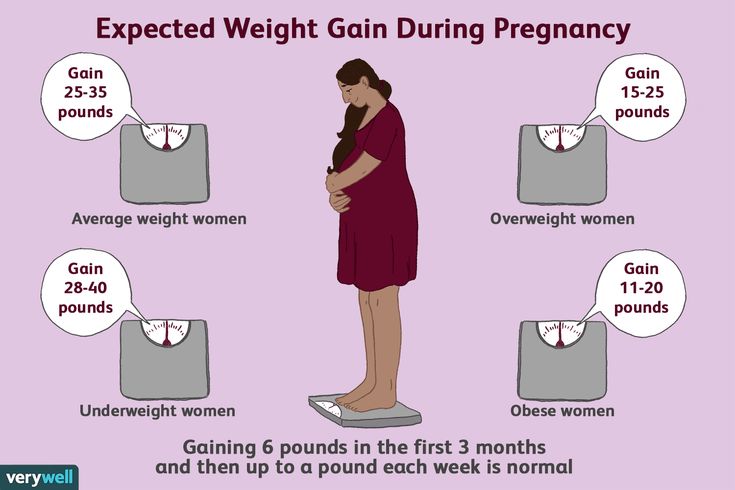
In general, women should try to get 150 minutes of aerobic exercise per week. This can include:
- walking
- cycling on a stationary bike
- swimming
- yoga
In this article, learn more general tips for gaining weight safely.
During the third trimester of pregnancy, women can expect to gain around 0.5 to 1 lb per week. Some ways to gain weight safely during pregnancy include eating a healthful and diverse diet and getting regular exercise.
Women can work with their healthcare team to track their weight gain throughout their pregnancy.
Weight category - articles from the specialists of the clinic "Mother and Child"
— What norms of weight gain during pregnancy are doctors guided by today?
- The average increase for all nine months is from 9 to 14 kg. The exact figure depends on many factors, but a sharp deviation in one direction or the other from the norm should be alarming. To calculate the allowable increase, the initial weight of the expectant mother should be taken into account: for example, women of a fragile physique (asthenic type) must gain more than initially obese women. In addition, it is important to consider the trimester of pregnancy.
To calculate the allowable increase, the initial weight of the expectant mother should be taken into account: for example, women of a fragile physique (asthenic type) must gain more than initially obese women. In addition, it is important to consider the trimester of pregnancy.
— How does weight change in different trimesters?
- Weight gain throughout pregnancy is uneven: at the very beginning it is almost imperceptible, increases significantly towards the middle and may begin to decrease two weeks before delivery. In the first trimester, both weight gain and weight loss are considered normal. On average, during this period, the expectant mother is gaining from 1.5 to 2.5 kg. In the second trimester, the baby begins to grow actively and the numbers will be different: about 500 g per week for thin women, no more than 450 g for pregnant women with normal weight and no more than 300 g for full ones. In the third trimester, the weight of the expectant mother should not increase by more than 300 g per week.
— Why do pregnant women gain weight?
- Contrary to popular belief, weight gain is not only due to the mass of a growing baby and body fat - they make up about half of the total figure. For nine months, a woman's uterus increases, the volume of circulating blood and intercellular fluid increases, amniotic fluid and the placenta form.
— Why is excess weight dangerous?
- Rapid weight gain is typical for multiple pregnancies, underweight women and too young mothers whose bodies are still developing. Often it is the result of normal overeating and requires adjustment of the diet. Diets and fasting days (especially the so-called "hungry") during the period of bearing a child are strictly prohibited even if the pregnant woman is overweight. It is very important to ensure that the baby receives all the nutrients, vitamins and trace elements, so you just need to balance your diet accordingly.
Excess weight may occur due to fluid retention, which manifests itself in the form of edema.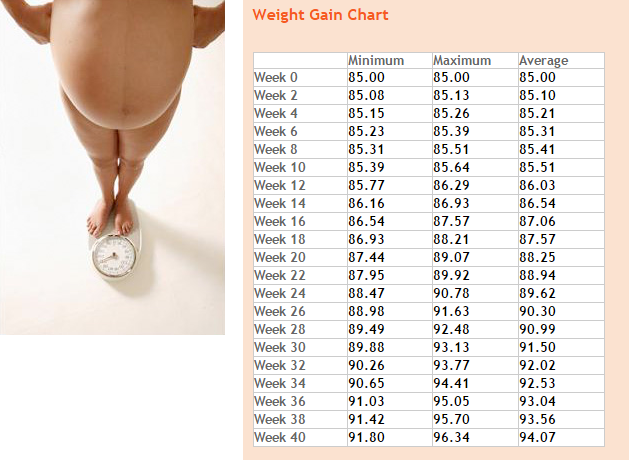 By the way, this is especially true for working pregnant women: sedentary work provokes stagnation of fluid in the lower extremities and pathological weight gain. In this case, wearing compression stockings, leg exercises and regular walking is recommended.
By the way, this is especially true for working pregnant women: sedentary work provokes stagnation of fluid in the lower extremities and pathological weight gain. In this case, wearing compression stockings, leg exercises and regular walking is recommended.
— Is slow weight gain dangerous, on the contrary?
- Some expectant mothers gain the first kilograms only after the 14th week - usually for petite women who do not have a genetic predisposition to be overweight or women suffering from toxicosis. In the first case, weight gains slowly throughout all nine months, which, if the pregnant woman feels normal, should not cause concern. If we talk about early toxicosis, then by the second trimester the malaise usually disappears, body weight returns to normal and weight gain goes on as usual.
Weight during pregnancy. What increase is considered optimal?
Why is excessive weight gain during pregnancy particularly harmful? What should be the calorie content of the diet? How to build your diet so that you can eat varied (and tasty), but at the same time not gain too much? Let's figure it out.
What makes up weight gain during pregnancy?
An increase in the subcutaneous fat layer during pregnancy is a normal and natural process.
While the baby is growing inside you, he needs energy and external protection. But during pregnancy, weight increases not only and not so much due to the adipose tissue of the mother: there is more fluid in the body, the uterus grows, the fetus and placenta develop, and the breasts increase in preparation for the feeding process.
Interestingly, weight loss during the period of toxicosis can later provoke its increase: the body will try to regain what was lost.
Expectant mothers especially actively gain weight in the second trimester and the beginning of the third, but closer to childbirth, a pregnant woman can even lose 1-2 kilograms.
As long as the weight increases more or less evenly and does not go beyond the upper limit of the norm, there is nothing to worry about. But if your weight is rapidly going up, you should be wary.
How to correctly calculate the weight, and what increase is considered optimal?
In Russian obstetric practice, it is generally accepted that the total gain should not exceed 12 kg. for the entire pregnancy. Of these 12 kg. 5-6 accounts for the fetus, placenta, amniotic fluid, another 1.5-2 - for an increase in the uterus and mammary glands, and only 3-3.5 - for the fat mass of a woman.
But this is a general indicator, a kind of "average temperature in the hospital." The optimal increase is calculated individually and depends on the initial weight of the pregnant woman, her age, the number of fetuses and the size of the child (children), physical activity.
WHO recommends that optimal weight gain be calculated based on Body Mass Index (BMI).
It is determined by the formula: body weight (kg) / height squared (m).
| BMI | Recommended weight gain |
|---|---|
19. 8-26 (normal body weight) 8-26 (normal body weight) | 12.5-15 kg |
| 26.1-29 (overweight) | 11.5 - 14 kg |
| over 29 (obese) | 7-9 kg |
How to calculate the optimal weight gain?
To do this, use the following chart:
- Calculate your BMI: divide your initial weight in kg. for height in meters squared.
For example, your “pre-pregnancy” weight was 60 kg with a height of 170 cm.
BMI = 60: (170 x 170) = 20.76.
- A BMI less than 18.5 indicates underweight. Indicators from 18.5 to 25 are within the norm, from 25 to 30 are above the norm, and a figure greater than 30 indicates obesity.
- Now that you know your BMI, find the optimal weekly increase in the table and compare it with yours.
| Week of pregnancy | Underweight before pregnancy (BMI less than 18. 5) 5) | Normal pre-pregnancy weight (BMI 18.5 to 24.9) | Overweight before pregnancy (BMI over 30) |
|---|---|---|---|
| 4 | 0-0.9 kg | 0-0.7 kg | 0-0.5 kg |
| 6 | 0-1.4 kg | 0-1 kg | 0-0.6 kg |
| 8 | 0-1.6 kg | 0-1.2 kg | 0-0.7 kg |
| 10 | 0-1.8 kg | 0-1.3 kg | 0-0.8 kg |
| 12 | 0-2 kg | 0-1.5 kg | 0-1 kg |
| 14 | 0.5-2.7 kg | 0.5-2 kg | 0.5-1.2 kg |
| 16 | up to 3.6 kg | up to 3 kg | up to 1.4 kg |
| 18 | up to 4.6 kg | up to 4 kg | up to 2.3 kg |
| 20 | up to 6 kg | up to 5.9 kg | up to 2.9 kg |
| 22 | up to 7.2 kg | up to 7 kg | up to 3. 4 kg 4 kg |
| 24 | up to 8.6 kg | up to 8.5 kg | up to 3.9 kg |
| 26 | up to 10 kg | up to 10 kg | up to 5 kg |
| 28 | up to 13 kg | up to 11 kg | up to 5.4 kg |
| 30 | up to 14 kg | up to 12 kg | up to 5.9 kg |
| 32 | up to 15 kg | up to 13 kg | up to 6.4 kg |
| 34 | up to 16 kg | up to 14 kg | up to 7.3 kg |
| 36 | up to 17 kg | up to 15 kg | up to 7.9 kg |
| 38 | up to 18 kg | up to 16 kg | up to 8.6 kg |
| 40 | up to 18 kg | up to 16 kg | up to 9.1 kg |
Recently, doctors are increasingly talking about an individual approach and urge not to panic if the increase is slightly beyond the normal range. When assessing the state of health of a pregnant woman, the doctor focuses not only on weight, but also takes into account the results of tests and examinations and other important indicators.
Why is excessive weight gain dangerous?
Gaining extra pounds can lead to gestational diabetes, hypertension, preeclampsia, or cause a caesarean section.
In addition, excessive weight gain during pregnancy may increase the risk of obesity and associated cardiovascular disease.
What can I do to keep my weight within normal limits during pregnancy?
First of all, consult a nutritionist. If there is no such doctor in the antenatal clinic, it makes sense to contact a specialist on a commercial basis. He will develop an individual diet, which will contain all the useful elements, and will offer to keep a food diary. It will also tell you how to eat right and weigh yourself.
To prevent excessive weight gain during pregnancy, it is enough to follow simple rules of a healthy diet:
- Eat often and in small portions;
- Always keep a “healthy snack” on hand: fresh apple wedges, unsweetened crackers, dried fruit, or sugar-free yogurt;
- Refuse soda, chips, sausages and sausages;
- Minimize sweets;
- Avoid fast food;
- Limit the use of condiments, especially salt, which retains water in the body;
- Choose steamed dishes;
- Eat more fiber-rich foods such as whole grain bread, bran, vegetables;
The diet of a pregnant woman should be varied. Include grains, vegetables, fruits, dairy products, meat and fish, legumes, or nuts.
It must be remembered that expectant mothers should never starve and adhere to extreme diets.
How many calories per day do you need during pregnancy?
It is difficult to calculate the energy value per day on your own, and then strictly adhere to a certain number of calories, and it is not necessary, unless it is recommended by a nutritionist or endocrinologist. On average, you can aim for 2000-2500 calories per day, but it is important to understand that the need for calories depends on many factors: age, initial weight, health status and level of physical activity.
When should I be on the alert?
Strictly speaking, it is better for a pregnant woman not to worry and entrust her condition to a doctor who will monitor the development of pregnancy, analyzes and monitor weight. It is important to take tests to determine the level of fasting blood glucose once a trimester.












